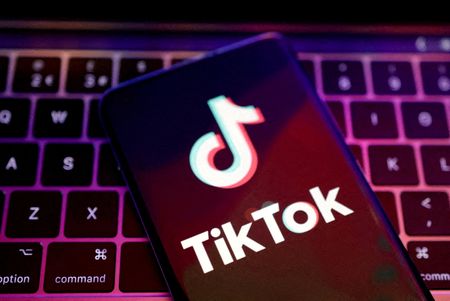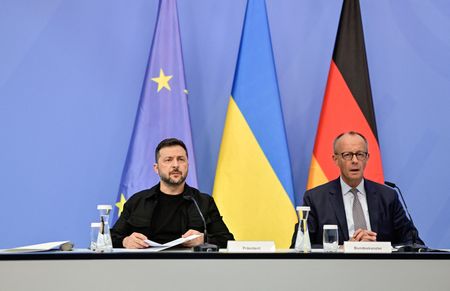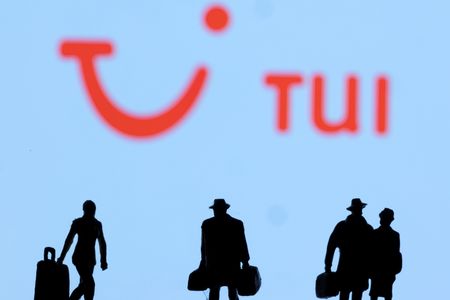By Elizaveta Gladun and Octav Ganea
BUCHAREST (Reuters) – Many young Romanians are again scrolling through video-sharing platform TikTok for guidance on how to vote in Sunday’s rerun of a presidential election annulled over allegations of Russian meddling via suspicious TikTok accounts.
With around 9 million TikTok users, the nation of 19 million people experienced a surge in such accounts last year during a campaign that eventually led to the annulment of the Nov. 24 election. Moscow has denied the allegations of manipulation.
In the first round of that cancelled election on Nov. 24, far-right candidate Calin Georgescu, who had been polling in single digits before the ballot, rose into first place amid an explosion of content on TikTok that favoured him.
Now, George Simion, leader of the radical right Alliance for Uniting Romanians (AUR), tops the presidential candidate list with 1.3 million followers on TikTok. Lagging far behind with about 233,600 followers is Victor Ponta, a former leftist prime minister whose politics have turned ultranationalist. The remaining, centrist candidates have even fewer followers.
The 38-year-old Simion’s TikTok films combine nationalist rhetoric with an emotionally charged delivery and often use direct-to-camera speeches, footage from political gatherings and behind-the-scenes clips to hone a sense of personal connection.
“The time for rebirth has come,” he told followers in a video posted on Tuesday. “Our nation will find its way again … We have within us the power to be reborn and to move forward, more united and stronger.”
Remus Stefureac, chief executive of INSCOP Research, said all the presidential candidates now appreciated the pivotal role of social media in campaigning.
“If we analyse our presidential campaign…, we can say that each and every one of the relevant candidates tried to build strong operations online and on social media, so they invested a lot of their resources in this type of campaign,” he said.
YOUNG AUDIENCE
TikTok’s Romanian audience is predominantly young: 64.6% are aged 18–24 and 33.7% are aged 25–34, according to Start.io, a mobile advertising platform that analyses app-based user data.
Young people interviewed by Reuters in downtown Bucharest this week said they obtained information from various online sources, among them TikTok.
Andrei, an engineer who declined to give his full name, said he trusted what he saw on TikTok to a limited extent, though news media sites seemed more credible. He said around a third of people he knew based their political decisions on TikTok material.
Andreea, a student who also withheld her full name, said she was influenced politically largely by TikTok videos. She had watched many TikTok political videos and they had helped her feel closer to the lives of candidates.
TikTok says it has formed a task force to ensure effective moderation of content and has launched a media literacy campaign to help users spot disinformation. In January, the company said it had blocked more than 116,000 spam accounts from being created in Romania during the second half of December.
It also said in a recent report that during the second half of 2024 it had removed over 27,000 accounts operated via a “fake engagement vendor” that had promoted the AUR and Georgescu.
Romania’s government has ordered that campaign materials on social media be clearly labelled as such, while local media said the Central Electoral Bureau had ordered the removal of over 500 unverified or mislabelled posts.
In the wake of the annulled election, the European Commission opened formal proceedings against TikTok over its suspected failure to limit interference in the vote.
Stefureac said Romania’s experience from 2024 should serve as a lesson for the future of democracy worldwide – “that we cannot take our democracies for granted and we need to find ways to better control and moderate how political and electoral communication is managed through social media”.
(Reporting by Octav Ganea and Elizaveta Gladun, writing by Krisztina Than; editing by Mark Heinrich)










